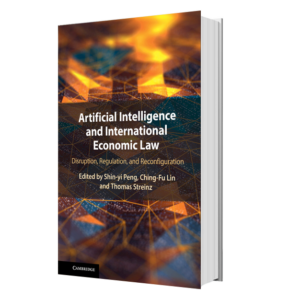
Artificial intelligence (AI) technologies are transforming economies, societies, and geopolitics. Enabled by the exponential increase of data that is collected, transmitted, and processed transnationally, these changes have important implications for international economic law (IEL). This volume examines the dynamic interplay between AI and IEL by addressing an array of critical new questions, including: How to conceptualize, categorize, and analyze AI for purposes of IEL? How is AI affecting established concepts and rubrics of IEL? Is there a need to reconfigure IEL, and if so, how? Contributors also respond to other cross-cutting issues, including digital inequality, data protection, algorithms and ethics, the regulation of AI-use cases (autonomous vehicles), and systemic shifts in e-commerce (digital trade) and industrial production (fourth industrial revolution). The book is available open access on Cambridge Core.
Read PDFRead PDF



